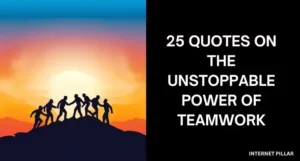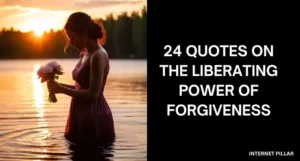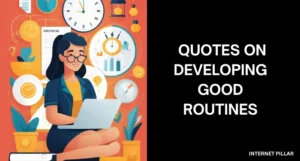Injustice, inequality and oppression are the ugly realities that plague our world today.
While many of us wish to ignore, some courageously shine a light on these societal ills.
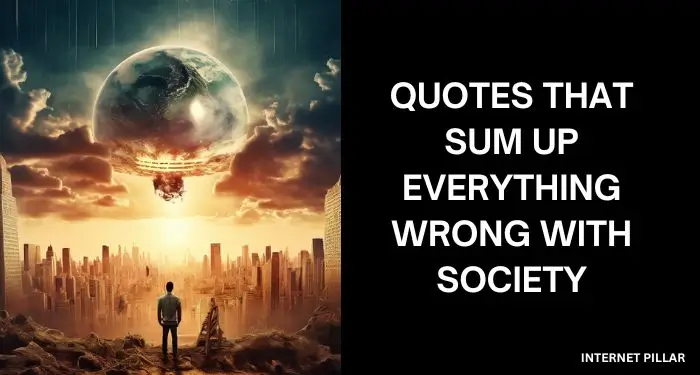
In this blog post, I’ve curated 15 powerful quotes from renowned activists, authors and thought leaders that expose the deep-rooted problems in our society.
Let’s get started.
1. “I guess the only time most people think about injustice is when it happens to them.” – Charles Bukowski
This blunt quote from the renowned American writer Charles Bukowski hits the nail on the head.
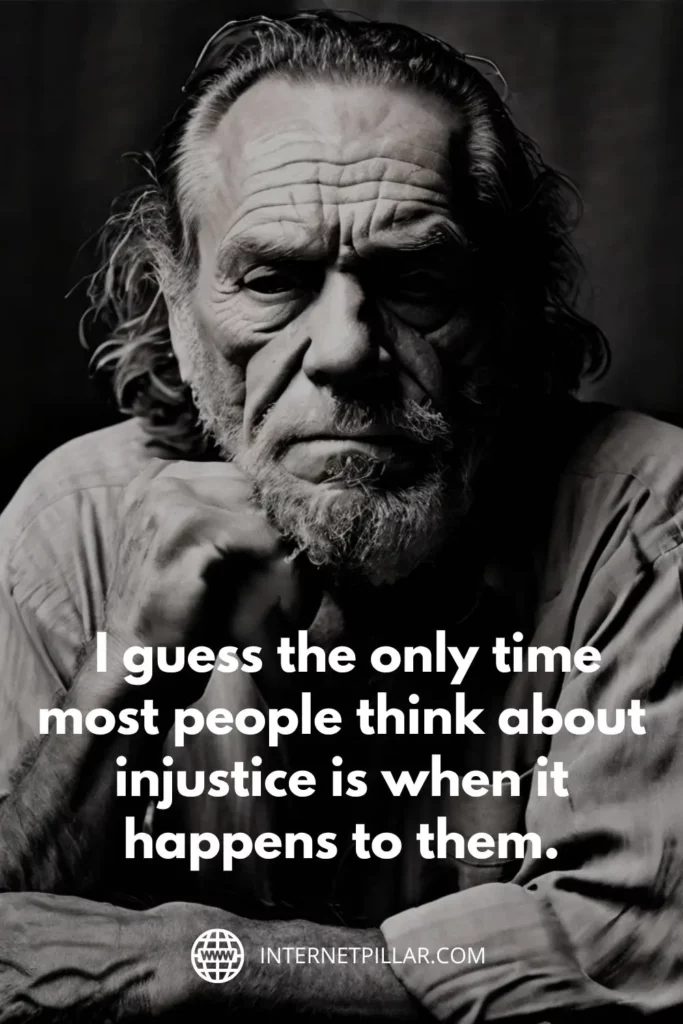
Too often, we only care about injustice when it directly affects us. We fail to empathize with the struggles of others and overlook the suffering around us.
This self-centered mindset allows systemic injustices to persist unchecked.
As Bukowski suggests, true progress requires us to be vigilant against all forms of unfairness, not just the ones that impact us personally.
2. “Injustice anywhere is a threat to justice everywhere.” – Martin Luther King Jr.
Civil rights icon Martin Luther King Jr. eloquently captures the interconnected nature of injustice.
When we allow wrongdoing to occur in one part of society, we compromise the integrity of the entire system.
Injustice, no matter how small or isolated, has a corrosive effect that spreads and undermines the foundations of a just, equitable world.
King’s words remind us that we must fight against all manifestations of oppression, for they threaten the freedom and dignity of us all.
3. “There are wrongs which even the grave does not bury.” – Harriet Jacobs
Harriet Jacobs, a former enslaved woman and renowned abolitionist, poignantly captures the enduring legacy of injustice.
Even after the perpetrators of oppression have passed on, the scars and trauma they have inflicted live on.
Jacobs’ words underscore the importance of acknowledging and confronting historical wrongs, for they continue to shape the present and future.
4. “You cannot kill the truth. You cannot kill justice. You cannot kill what we are fighting for.” – Jean Dominique
Haitian democracy activist Jean Dominique reminds us that the pursuit of truth and justice is an indestructible force.
No matter how powerful the forces of oppression may be, they cannot extinguish the human desire for freedom, equality and accountability.
Dominique’s words inspire us to persevere in our struggles against injustice, for the ideals we fight for are larger than any individual or regime.
5. “A political struggle that does not have women at the heart of it, above it, below it and within it is no struggle at all.” – Arundhati Roy
Acclaimed Indian author Arundhati Roy underscores the vital role of women in the fight for social and political change.
She argues that any movement for justice and equality that fails to center the experiences and leadership of women is inherently incomplete and doomed to fail.
Roy’s words challenge us to recognize the intersectionality of oppression and to ensure that our efforts to create a more equitable society are inclusive and representative of all marginalized groups.
6. “Freedom is never granted; it is won. Justice is never given; it is exacted.” – A. Philip Randolph
Civil rights leader A. Philip Randolph reminds us that the pursuit of freedom and justice is an ongoing, arduous struggle.
These fundamental human rights are not bestowed upon us by the powerful; they must be fought for and claimed through collective action and unwavering determination.
Randolph’s words underscore the need for sustained, grassroots activism to dismantle the entrenched systems of oppression and inequality that pervade our society.
7. “Greed has poisoned man’s souls.” – Charlie Chaplin
In this powerful quote, legendary actor and filmmaker Charlie Chaplin laments the corrosive effects of greed on the human spirit.
He suggests that the relentless pursuit of wealth and material gain has eroded our sense of empathy, compassion and concern for the wellbeing of others.
Chaplin’s words serve as a stark warning about the dangers of unchecked capitalism and the prioritization of profit over people.
8. “Educating the mind without educating the heart is no education at all.” – Aristotle
The ancient Greek philosopher Aristotle reminds us that true education must nurture not just the intellect, but also the moral and emotional faculties of the individual.
He argues that a purely academic approach, devoid of ethical and compassionate considerations, is ultimately incomplete and ineffective.
Aristotle’s words call us to reimagine education as a transformative process that cultivates not just knowledge, but also empathy, social responsibility and a commitment to justice.
9. “Some things you must always be unable to bear. Some things you must never stop refusing to bear. Injustice and outrage and dishonor and shame. No matter how young you are or how old you have got. Not for kudos and not for cash: your picture in the paper nor money in the bank either. Just refuse to bear them.” – William Faulkner
Acclaimed novelist William Faulkner urges us to cultivate an unwavering intolerance for injustice.
He argues that we must never become complacent or indifferent in the face of wrongdoing, no matter the personal cost.
Faulkner reminds us that true moral courage lies in our willingness to stand up against societal ills, even when it brings us no tangible rewards.
It is our duty as human beings to relentlessly challenge injustice, dishonor and shame wherever they manifest.
10. “We are unnecessarily wasting our precious resources in wars… if we must wage war, we have to do it on unemployment, disease, poverty and backwardness.” – Atal Bihari Vajpayee
Former Indian Prime Minister Atal Bihari Vajpayee eloquently critiques the misplaced priorities of modern society.
He argues that the vast resources and energy devoted to military conflicts should instead be channeled towards addressing the pressing issues of poverty, disease and lack of development.
11. “Good governance depends on ability to take responsibility by both administration as well as people.” – Narendra Modi
Indian Prime Minister Narendra Modi highlights the shared responsibility between governments and citizens in achieving good governance and social progress.
He suggests that true change cannot be imposed from above, but rather requires active engagement and accountability from both those in power and the general populace.
Modi’s words underscore the importance of fostering a culture of civic participation, transparency and mutual trust between the rulers and the ruled.
12. “Progress is more plausibly judged by the reduction of deprivation than by the further enrichment of the opulent.” – Amartya Sen
Renowned economist Amartya Sen offers a critical perspective on how we measure societal progress.
He argues that true development should be evaluated not by the accumulation of wealth by the privileged few, but by the alleviation of poverty and deprivation among the most marginalized.
Sen’s words challenge us to reorient our priorities and to direct our resources and efforts towards uplifting the lives of the least fortunate, rather than catering to the insatiable demands of the elite.
Only then can we claim to be making meaningful progress as a society.
13. “The test of progress is not whether we add more to the abundance of those who have much; It is whether we provide enough for those who have little.” – Franklin D. Roosevelt
Former US President Franklin D. Roosevelt echoes Amartya Sen’s sentiment, emphasizing that the true measure of a society’s advancement lies in its ability to care for the most vulnerable.
He suggests that progress should not be defined by the further enrichment of the already affluent, but by the provision of basic necessities and opportunities for those who have the least.
Roosevelt’s words challenge us to reexamine our economic and social policies through the lens of equity and compassion and to ensure that the fruits of progress are equitably distributed across all segments of the population.
14. “If one really wishes to know how justice is administered in a country, one should not examine the works of jurists, philosophers, or even politicians, but look at the policeman on the beat and the magistrates in the local courts.” – Alexis de Tocqueville
French philosopher Alexis de Tocqueville offers a profound insight into the true nature of justice in a society.
He suggests that the true measure of a country’s commitment to justice lies not in the lofty rhetoric of its leaders or the philosophical treatises of its intellectuals, but in the day-to-day realities experienced by the most marginalized members of the population.
15. “All too often, when we see injustices, both great and small, we think, That’s terrible, but we do nothing. We say nothing. We let other people fight their own battles. We remain silent because silence is easier. Qui tacet consentire videtur is Latin for ‘Silence gives consent.’ When we say nothing, when we do nothing, we are consenting to these trespasses against us.” – Roxane Gay
Acclaimed writer Roxane Gay powerfully articulates the corrosive nature of silence in the face of injustice.
She reminds us that by remaining passive and failing to speak out, we are complicit in perpetuating the very wrongs we claim to abhor.
Gay’s words urge us to overcome our comfort and complacency and to actively resist injustice through our words and actions.
Silence may be the easier path, but it is a betrayal of our moral obligation to create a more just world.
Through these powerful quotes, we are confronted with the harsh realities of injustice, inequality and oppression that continue to plague our world.
From the self-centered indifference of the masses to the corrosive effects of greed and the failures of our institutions, these words lay bare the deep-rooted problems that undermine the foundations of a just and equitable society.
By heeding the wisdom and moral urgency of these voices, we can work towards creating a world where freedom, dignity and justice are not mere ideals, but the lived experiences of all people.

